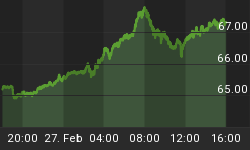Unallocated gold is the most widely traded form of gold in the world. It hides a way of advantaging the provider - usually a bank - by subjecting buyers to a risk they will frequently remain unaware of until it is too late. The widely quoted 'spot price' refers to this unallocated gold, and this is how it works :-
-
When a bank sells you unallocated gold on the spot market you become a creditor - i.e. the bank owes you gold which you do not own. In law you become a depositor of gold. Most people now relax in the belief that they own gold securely in the bank, and they do not pay the little extra - above the spot - to have their trade formally allocated.
-
A bank is required by its regulator to hold a proportion of its liabilities as certain types of assets capable of being turned into cash quickly during times of crisis. It is a liquid reserve and it's there to protect the bank from a common type of problem - a liquidity crisis - which occurs when a bank has short term deposits, long term loans, and insufficient cash to meet the immediate demand for withdrawals. Physical gold bars are accepted as a very good form of liquidity reserve because they can be turned quickly into cash.
-
If a bank has physical possession of some gold which it owes you as its creditor the bank itself is the current owner of the gold. While this gold remains unallocated to you the regulator considers it part of a bank's liquid reserve. This makes unallocated gold an attractive way for the bank to maintain its regulated liquidity, because you have paid for your gold, and the bank is free to use your money, while it is also able to add your unallocated gold holding to its own reserve.
-
So your unallocated gold would be ditched if the bank were in need of cash, and it has no choice in the matter because liquid reserves are there to be sold at short notice to protect the bank's general creditors - all of whom, including you, must receive a proportionate share of whatever is raised from the sale of these and other bank assets if the crisis were to deepen and the bank were to become insolvent.
-
If that did happen you would be in a bad position. The bank's usually small gold reserve would be diluted by non-performing bond portfolios and other assets which don't sell well in a crisis. The last line of defence for bank depositors is deposit protection, which is a state underwritten mainstay of banking confidence in the West. But it does not apply on bullion debts like yours. Deposit protection is there as a confidence builder for the national currency only, which means unallocated gold actually offers less protection from bank failure than a cash deposit. So having been the provider of the bank's liquidity reserve you will then be in the minority of those offered no protection by the state's guarantee.
-
So it is important not to be impressed by unallocated gold, or by it being physically stored in a bank's vault, or by it being checked daily by bank regulators. Regulators are checking it to make sure the bank maintains a liquid reserve, and they are not especially interested in your entitlement as a bullion creditor.
Allocated gold is different because you become the outright owner of gold and you are no longer a creditor. Your allocated gold is your property and it cannot be used as the bank's reserve, so with allocated gold you get proper protection from systemic failure. Unfortunately with allocated gold your money does the bank no good. And since modern banks reckon to earn 20% each year on capital employed their loss of use of your allocated gold is disappointing for them. This is why banks usually charge nothing for unallocated storage and at least 1.5% per annum for allocated storage, with the result that professionals in the bullion market reckon that less than 1% of gold traded within financial markets is allocated.
This is how the huge majority of the world's owners of bank held gold are - probably unwittingly - storing their personal reserve in a way which fails to meet the most common objective of gold buyers.















